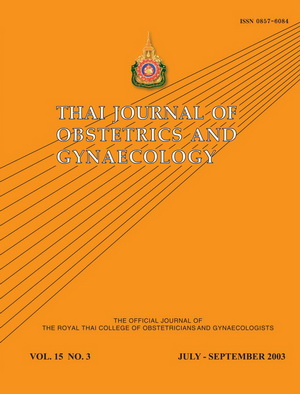Prevalence of Pelvic Lesions in Thai Women Undergoing Laparoscopic Tubal Sterilization at Siriraj Hospital
Main Article Content
Abstract
Objective To determine the prevalence and associated risk factors of pelvic lesions in apparently normal Thai women undergoing laparoscopic tubal sterilization at Siriraj Hospital.
Study design Retrospective descriptive study.
Setting Siriraj Reproductive Health Research Center, WHO collaborating center for research
in human reproduction, Faculty of Medicine Siriraj Hospital, Mahidol University.
Materials and Methods Case recorded forms of 1,700 women who had normal pelvic examination and underwent laparoscopic tubal sterilization at the center during 1984-2002 were reviewed.
Result Of 1,700 women, 276 (16.24%) had at least one pelvic lesion. The most common
abnormality was tubal lesions (9.94%), followed by ovarian lesions (3.94%), uterine myoma (2.82%), and endometriosis and/or pelvic adhesion (2.24%). Factors associated with an increased risk for pelvic lesions included age, obesity, abortion, dysmenorrhea, and duration of menstruation.
Conclusion It is not uncommon to discover various pelvic lesions during laparoscopic tubal sterilization in Thai women with normal pelvic examination. Although all of the lesions were benign and seemed to have no clinical significance, the information from this study would be useful for counseling, which is one important step of patient care.

